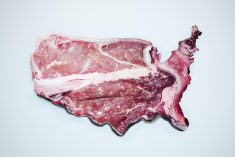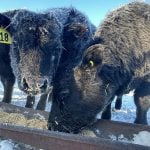Canada and Mexico may now impose retaliatory tariffs against U.S. goods at will over Washington’s country-of-origin labelling (COOL) rules — just in time for the process of erasing those rules to begin.
U.S. President Barack Obama late Friday signed the Consolidated Appropriations Act of 2016, an omnibus bill approving funding for various government agencies and projects through September 2016, plus other legislative amendments.
Among those were amendments to the U.S. Agricultural Marketing Act that remove beef and pork products from COOL coverage, by striking out the relevant references to beef, pork, ground beef and ground pork.
Read Also

Export flurry boosts EU barley market to ease grain glut
European Union barley exports could reach a 10-year high this season as brisk feed demand overseas and reduced competition from the Black Sea region help the EU to shift a large harvest.
COOL provisions, as they relate to imported lamb, goat, chicken, venison, ginseng, fish and shellfish and certain fruits, nuts and vegetables, remain in place.
With that repeal now official, the Dispute Settlement Body (DSB) of the World Trade Organization (WTO) on Monday nevertheless formally authorized Canada and Mexico to suspend tariff concessions granted to the U.S. on certain chosen goods, valued at up to C$1.055 billion and US$227.76 million per year, respectively.
Canada’s Trade Minister Chrystia Freeland and Agriculture Minister Lawrence MacAulay, in a statement Monday, described the WTO approval as “the final technical step in the WTO dispute settlement process.”
That said, the Canadian ministers “remain pleased that the U.S. has repealed COOL for beef and pork and that the U.S. Department of Agriculture has promised to make amendments to the relevant regulations as quickly as possible to reflect the legislative repeal.”
The Canadian government, they said, “will monitor implementation of the repeal to ensure discrimination against Canadian cattle and hog exports is removed expeditiously in the U.S. market. It is our hope that no retaliatory action will be needed in future.”
The WTO’s approvals for retaliation were originally due Friday, but were held up that day by a WTO ministerial meeting in Nairobi, Kenya on unrelated matters.
According to a WTO release announcing approval for retaliation, Canada and Mexico “reiterated their disappointment with the events that took place on Friday” delaying the authorization.
The Canadian and Mexican position was supported by the European Union, Australia, Japan and Korea, the WTO said, quoting Japanese officials as saying the delay “undermines the effective function and credibility of the dispute settlement system.”
The WTO, in its release, also acknowledged it had been informed by the U.S. delegate that Congress’ and Obama’s approvals for the repeal make the requests for tariff authorization “obsolete.”
Canada’s position on COOL has long been that while shoppers should be able to make informed decisions about the food they buy, the labelling rules in COOL led to “substantial additional costs that are incurred by those in the U.S. meat supply chain, including producers, processors, distributors, and retailers.”
Said costs are incurred by businesses that COOL requires to segregate Canadian animals and meat from their U.S. counterparts at each step in the production process, while facilities that handle U.S. animals only don’t incur any of these additional costs. — AGCanada.com Network














